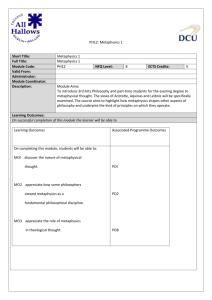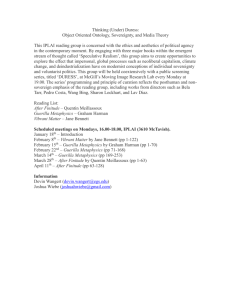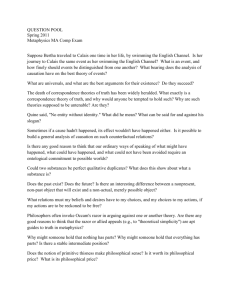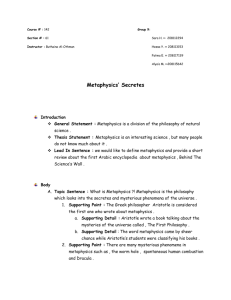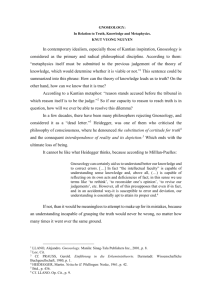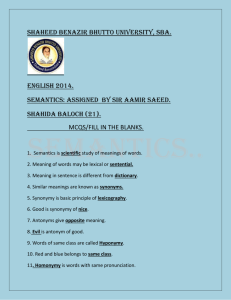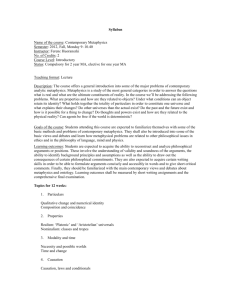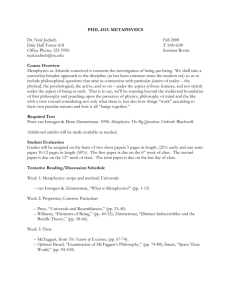PHI 2102 Metaphysics and Epistemology
advertisement
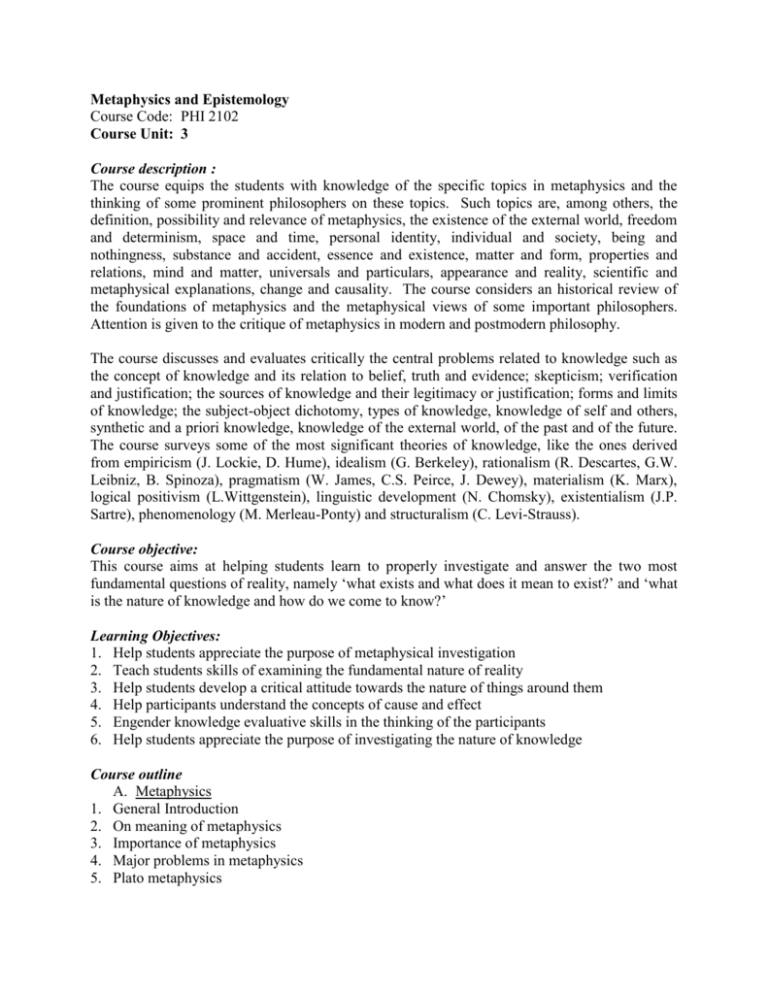
Metaphysics and Epistemology Course Code: PHI 2102 Course Unit: 3 Course description : The course equips the students with knowledge of the specific topics in metaphysics and the thinking of some prominent philosophers on these topics. Such topics are, among others, the definition, possibility and relevance of metaphysics, the existence of the external world, freedom and determinism, space and time, personal identity, individual and society, being and nothingness, substance and accident, essence and existence, matter and form, properties and relations, mind and matter, universals and particulars, appearance and reality, scientific and metaphysical explanations, change and causality. The course considers an historical review of the foundations of metaphysics and the metaphysical views of some important philosophers. Attention is given to the critique of metaphysics in modern and postmodern philosophy. The course discusses and evaluates critically the central problems related to knowledge such as the concept of knowledge and its relation to belief, truth and evidence; skepticism; verification and justification; the sources of knowledge and their legitimacy or justification; forms and limits of knowledge; the subject-object dichotomy, types of knowledge, knowledge of self and others, synthetic and a priori knowledge, knowledge of the external world, of the past and of the future. The course surveys some of the most significant theories of knowledge, like the ones derived from empiricism (J. Lockie, D. Hume), idealism (G. Berkeley), rationalism (R. Descartes, G.W. Leibniz, B. Spinoza), pragmatism (W. James, C.S. Peirce, J. Dewey), materialism (K. Marx), logical positivism (L.Wittgenstein), linguistic development (N. Chomsky), existentialism (J.P. Sartre), phenomenology (M. Merleau-Ponty) and structuralism (C. Levi-Strauss). Course objective: This course aims at helping students learn to properly investigate and answer the two most fundamental questions of reality, namely ‘what exists and what does it mean to exist?’ and ‘what is the nature of knowledge and how do we come to know?’ Learning Objectives: 1. Help students appreciate the purpose of metaphysical investigation 2. Teach students skills of examining the fundamental nature of reality 3. Help students develop a critical attitude towards the nature of things around them 4. Help participants understand the concepts of cause and effect 5. Engender knowledge evaluative skills in the thinking of the participants 6. Help students appreciate the purpose of investigating the nature of knowledge Course outline A. Metaphysics 1. General Introduction 2. On meaning of metaphysics 3. Importance of metaphysics 4. Major problems in metaphysics 5. Plato metaphysics 6. Aristotelian metaphysics 7. Essence and existence 8. The empirical and meta-empirical 9. Being 10. Space and time 11. Determinism and freedom B. Epistemology 1. Introduction 2. Knowledge and Its Types 3. Theories of Knowledge 4. Theories of Truth 5. Skepticism Methodology The facilitator(s) will employ the following methods; Lectures, in-class discussions, guided discovery, individual presentations, small group work Assessment Course work exercises 30% End of semester examination 70% Reading List 1. Butchvarov, Panayot (1979). Being Qua Being: A Theory of Identity, Existence and Predication. Bloomington and London: IndianaUniversity Press. 2. Harris, E. E. (1965). The Foundations of Metaphysics in Science. London: George Allen and Unwin. 3. Harris, E. E. (2000). The Restitution of Metaphysics. New York: Humanity Books. 4. Huemer, (2002), Epistemology: Contemporary Readings, Routledge Contemporary Readings in Philosophy 5. Kant, I (1781). Critique of Pure Reason. 6. Gale, Richard M. (2002). The Blackwell Guide to Metaphysics. Oxford: Blackwell. 7. Lowe, E. J. (2002). A Survey of Metaphysics. Oxford: OxfordUniversity Press. 8. Loux, M. J. (2006). Metaphysics: A Contemporary Introduction (3rd ed.). London: Routledge. 9. Kim, J. and Ernest Sosa Ed. (1999). Metaphysics: An Anthology. Blackwell Philosophy Anthologies. 10. Kim, J. and Ernest Sosa, Ed. (2000). A Companion to Metaphysics. MaldenMassachusetts, Blackwell, Publishers.

